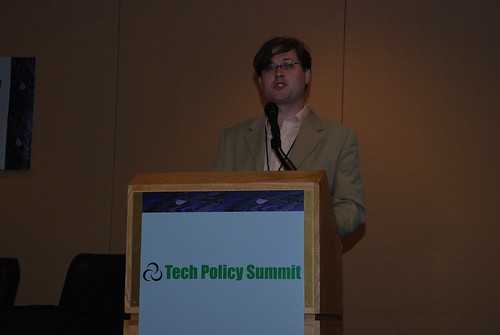Lots of Questions, No Easy Answers on Stimulus Funds at Tech Policy "Town Hall"
SAN MATEO, CALIF, May 11, 2009 – Familiar faces gathered and familiar arguments on the best way to spend $7.2 billion rang out Monday at the San Mateo Marriott as the 2009 Tech Policy Summit kicked off with a Broadband Innovation mini-conference, with an opening “town hall” on the “state of the stim
Andrew Feinberg

“Town Hall” Moderator Geoff Daily (Photo: Andrew Feinberg/BroadbandCensus.com)
SAN MATEO, CALIF, May 11, 2009 – Familiar faces gathered and familiar arguments rang out Monday at the San Mateo Marriott as the 2009 Tech Policy Summit kicked off with a Broadband Innovation mini-conference, with an opening “town hall” on the “state of the stimulus,” with various attendees exchanging ideas on the best way to spend $7.2 billion.
Moderator Geoff Daily, editor of App-Rising.com, called broadband stimulus “one of the hottest areas of tech policy today.” And there was no shortage of agreement from the heavily west-coast crowd. The stimulus is opportunity for “an amazing attempt to reboot America’s broadband policy,” Daily said.
Fixing America’s broadband problems will not be easy and will take time, Daily said. But it will take cooperation across various industries and stakeholders. Implementing the stimulus “needs to be an all hands on deck kind of effort,” he said.
Digital Village Associates founder Don Means suggested that expanding access to libraries was the best use of stimulus funds. Fiber to the library “extends the physical infrastructure,” he said. Libraries should be used as early adopters of emerging technologies to stimulate demand for new applications and move beyond a “digital divide” type solution, he said.
California libraries are taking this approach with a demand-side pilot program, Means said. With sixteen thousand libraries nationwide, even California’s system of eleven thousand is already “shovel ready,” he noted. But one attendee noted that many communities are losing libraries.
Wireless projects are already the most “shovel-ready,” said Scott Stevens, founder of Aspen Wireless. The stimulus goal is to deploy infrastructure as quickly as possible, he said. “Wireless can execute [the goals] in a time sensitive manner.”
Public safety organizations can also benefit from quick deployment of wireless broadband from the redundancy it would provide, backstopping traditional communications systems. Stevens said that fiber shouln’t be ignored, but wireless can fill the gap until it can be built out. “Wireless will deploy the system today — and right away,” he said. “It’s time to take a revolutionary standpoint.”
Wireless has been used successfully for almost two decades, and could be used to succesfully increase penetration quickly, said Brett Glass, CEO of Lariat.net — one of the first wireless ISPs in the country.
Free Press general counsel Marvin Ammori announced his group would release a report Monday calling for more use of wireless in broadband deployment. “I don’t think Brett Glass and I have ever agreed on anything,” he said. But wireless could be a real solution, he said.









Member discussion